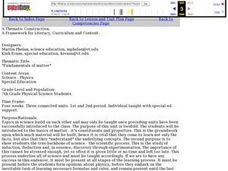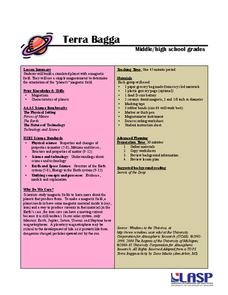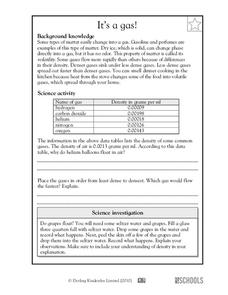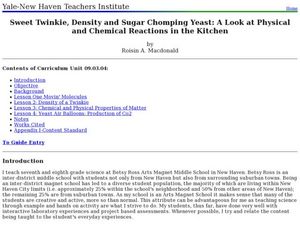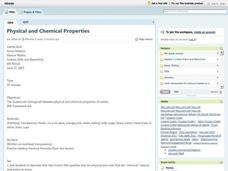Curated OER
How Does Altitude Relate To Density?
Students demonstrate an understanding of the properties of matter by applying them to density, pressure, and temperature. The educational software program, "Foilsim" is used in this inquiry.
Curated OER
Water and Ice
Students explore water. In this water lesson plan, students explore the physical properties and states of water. They observe how water changes states and document what they see.
Study Stack
Earth Science Crossword Puzzle
In this online interactive anatomy crossword puzzle worksheet, students use the 8 clues to find the appropriate answers to complete the word puzzle.
Curated OER
Food & Science - How Healthy is Your Diet?
Learners experiment with various foods to determine fat and starch content. They rub jam, peanut butter, bananas, and other foods in a small circle on a piece of paper, and observe the results. If there is a high fat content in the...
Curated OER
Matter And Its Changes
Fifth graders explore the phases of matter, make observations of matter, the physical and chemical properties of matter, solutions and mixtures, formation of molecules and atoms and molecules all through hands on activities.
Curated OER
Fundamentals of Matter
Seventh graders explore the the constituents and properties of matter. They use the scientific process while exploring solids, liquids, gases, the mass, volume and density of matter. Students plan and conduct an investigation to measure...
University of Colorado
Terra Bagga
One way to identify possible volcanic activity on other planets is by testing the planet for magnetism. A science lesson begins with pupils constructing their own planet from a dead battery, magnets, paper, and tape before labeling...
Curated OER
It's A Gas!
Fifth graders complete a worksheet which has them place a list of gases in order from the least to the most dense. The density in grams is given for each. There's a good paragraph which provides background knowledge about the volatility...
NOAA
Ocean Layers II
Now that you know the ocean has layers, let's name them. The seventh installment of a 23-part NOAA Enrichment in Marine sciences and Oceanography (NEMO) program covers terminology associated with ocean layers, such as thermocline and...
Salt River Project
How Do We Clean Polluted Water?
How do we clean up oil spills and other pollutants in the water? Explore water treatment strategies with a set of environmental science experiments. Groups remove oil from water, work with wastewater treatment, and perform a water...
University of Colorado
Modeling Sizes of Planets
The density of the huge planet of Saturn is 0.7 g/cm3, which means it could float in water! In the second part of 22, science pupils explore the size and order of the planets. They then calculate weight and/or gravity and density of...
Curated OER
Changing Sugar
In this chemical and physical change worksheet, students use a sugar cube and observe its physical properties both when it is whole and after it is crushed. They heat the sugar cube and record 5 properties of the matter while being...
Columbus City Schools
Sedimentary Rocks
Turn your class discussion of rock formation from ho-hum to holy hornfels! Junior geologists gain experience in identifying rock types and rock origins, with an emphasis in hypothesizing the environment needed to form certain...
Curated OER
Evidence of Chemical Change
In this chemical change worksheet, students conduct 4 experiments set up around the room. They follow the instructions at each station for each experiment and list the physical properties and observe any changes at each station. Students...
Curated OER
Properties of Matter Word Search Puzzle
In this science worksheet, learners look for the words that are associated with the measurements taken in an average science class.
Curated OER
Properties of Color
Second graders explore the properties of primary color and investigate what happens when primary colors are mixed. They listen to the story The Crayon Box That Talked and list the colors. They experiment mixing primary colors and...
Curated OER
What State Are You?
Students identify three states of matter and recognize plasma as fourth state. They provide examples of matter that are classified in particular state and identify properties of each state of matter.
Curated OER
Sweet Twinkies, Density and Sugar Chomping Yeast: A Look at Physical and Chemical Reactions in the Kitchen
Students investigate matter. In this physical science lesson plan, students will learn about matter, physical states, and reactions. There are a series of four lab activities that will be conducted.
Curated OER
What's The Scoop?
Students explore the properties of matter. In this cross curriculum three states of matter science lesson, students listen to the poem "Eighteen Flavors" by Shel Silverstein, and predict what will happen if listed ingredients are...
Curated OER
Properties of Magnetic Forces
Students explore what a magnetic force is and what kinds of objects are attracted to a magnet. They use a magnet to sort objects taht are and are not attracted to a magnet. Students then explain why the objects were or were not...
Curated OER
Spectroscope
Students examine how to apply conservation of energy and properties of matter to a spectroscope. In this energy lesson plan students build their own spectroscope and observe three kinds of spectra.
Curated OER
Physical and Chemical Properties
Students study the difference between physical and chemical properties. They also discuss changes in matter, known as physical and chemical changes. They observe and discuss several demonstrations of both physical and chemical changes
Curated OER
Ice Cream Blizzards
Fourth graders explore whether the making of homemade ice cream is a physical change or a chemical change in a lab experiment. Students identify states of matter, describe the physical properties of states, and collect temperature data...
Curated OER
Water and Ice
Pupils explore water as it changes states of matter. In this physical property lesson, students use observation, measurement, and communication skills to describe changes in water as it goes from a solid to a liquid and back again.







